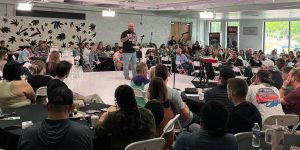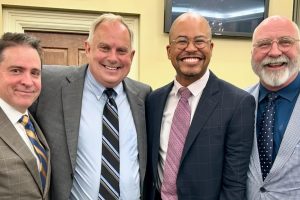Our economics matter as much as ever. It matters because what we consume and how we consume has a profound impact on our lives, as well as the health and well being of our neighbors and the planet at large. If we continue to consume resources at the rate we are going, we will quite literally kill off our entire species, and along the way kill off everything else as well. What this means is our decision to exploit the planet for our own gain is detrimental, and is oppressive on countless levels. Christians, therefore, are not free to ignoring the scope of the problem as it concerns our patterns of consumption and their effect. Christ followers have a responsibility to thoughtfully and creatively respond to systems that obtain and distribute goods in ways that are harmful or unjust, and for everyone’s sake, our response must be timely. Though our planet is resilient, it’s also fragile, meaning this is no time to waffle around.
In simple terms, economics means, “managing the household.” It’s ensuring that those who live in our home have what they need to flourish. But in a globalized context doing so can be very difficult.
What are the bounds of our “home”? Are we talking about our local community, our country, or the world? Who are we responsible for? And what’s the relationship between our local economies and the global market?
Surrounded by billions of people we easily succumb to the temptation of hoarding, holding, clutching, keeping, and hiding what we have (as well as who we are). Knowing there are a large number of people living in abject poverty with little to no access to clean water or adequate food and shelter, many of us are left to conclude that there’s not enough for everyone—not enough food, not enough water, not enough resources of any kind. And we then adopt an attitude of scarcity. Overwhelmed by the fear of lack or loss, we become obsessed with having and holding onto what we “earned” and working hard to get more, and to this end we give the bulk of our time and energy.
While most of us are not aware of it, a cultural ethos of scarcity is created by a transactional economy. When you reduce the majority of our interactions to the exchange of financial capital, you in turn create a society full of high-strung, stressed out, anxious people who are primarily worried about securing comfort for themselves, i.e. having enough financial capital.
What’s even worse, as far as I’m concerned, is that a transactional economy also dissolves social ties by turning everything into goods and services for sale. This consequentially leaves people feeling isolated and alone, and sadly, those with the most money are likely to feel the most alone because their relationships with others are defined more by competition than cooperation; however, this is what they have to do to get ahead and stay there. So instead of building community with others and collaborating with them to create places of equity and justice for all, their actions are dictated more or less by a survival mindset.
It’s exhausting. It’s isolating. And it’s not sustainable. There’s got to be a better way to manage our household and ensure that everyone’s needs are met.
In my own experience, life so easily becomes about obtaining, getting, and securing for ourselves alone. This is unfortunate on a number of levels, but for one, it stifles creativity and leads us to look for as many ways as possible to acquire financial capital, even if it means forfeiting the true, the beautiful, and the good. Which is to say, offering something to the world, creating and delivering something of meaning to others, is only valuable in as much as it is able to procure a financial return. And so most of us become cogs in the machine, and even when it doesn’t feel right, we squander our creative energies and buy into a system that forces us to value such things as security, comfort, independence, autonomy, efficiency and competition above all other things.
When you find yourself in this kind of system, it’s normative to be dissatisfied, so much so that our desire for more becomes insatiable. In a capitalistic economy, this is how things work. We’re not taught or encouraged to give more, but instead are consciously and unconsciously convinced to take more. After all, if our desires for more were satisfied then the market would collapse. Truth be told, in such a context healthy communities and healthy persons are hard to come by.
And yet healthy communities and healthy person is exactly what God is seeking to create.
Having been delivered from slavery in Egypt, the Israelites found themselves in the wilderness. God had promised them a new land, but they doubted his provision and found themselves wandering and wondering what God would have them to do and whom God would have them to be. They had each other, but they felt very disoriented. Any sense of comfort and security they had once had was lost, and they found themselves complaining, asking God to provide for them and give them some guidance.
God spoke to Moses, “I’ve listened to the complaints of the Israelites. Now tell them: ‘At dusk you will eat meat and at dawn you’ll eat your fill of bread; and you’ll realize that I am God, your God.’”
That evening quail flew in and covered the camp and in the morning there was a layer of dew all over the camp. When the layer of dew had lifted, there on the wilderness ground was a fine flaky something, fine as frost on the ground. The Israelites took one look and said to one another, man-hu (What is it?). They had no idea what it was.
So Moses told them, “It’s the bread God has given you to eat. And these are God’s instructions: ‘Gather enough for each person, about two quarts per person; gather enough for everyone in your tent.”
God provided.
God always provides.
Gandhi once said, “The world has enough for everyone’s need, but not enough for everyone’s greed.”
We’re all needy, but we don’t have to be greedy.
What would it look like if we trusted God fully and completely with our lives? What if instead of hoarding and holding onto what we have, we shared the best of what we have with others?
God provided the Israelites with manna, and God intends to provide for us as well. We are free, therefore, to be generous. We don’t have to believe everyone’s out to get us, and we don’t have to believe scarcity is the norm. We can live in a different way. We can approach the world with open arms and open hands. And we can know that generosity is the engine that moves us forward by drawing us together.
As a follower of Jesus, I believe God is at all times creating, sustaining, and holding things together. This means we are not alone in the universe. God cares for us and wants us to feel secure and safe. While material things may enhance our lives, they will never be able to deliver the kind of peace we need to live lives marked by freedom.
According to Dietrich Bonhoeffer, true freedom can only be found when we are free for our neighbor, and this kind of freedom for our neighbor can only happen when we make room for their needs in our life and choose to share what we have with them, trusting that they too will share what they have with us. Creating this kind of economy is first and foremost about shared life, and the giving and receiving of persons as much as possessions.
There’s a fantastic word for this sense of shared need that Desmond Tutu popularized, and it’s “ubuntu.” It essentially means, “We are who we only in relationship to others; we are a person through other persons.”
We need each other.
At the end of the day there’s no such thing as an autonomous human being; our separation from others, our independence, is an illusion. To quote Thomas Merton, “No man is an island.” Each of us is embedded in a community, in a culture, in an environment, and whom we are is at all times being shaped by the people and places around us. We can’t afford to ignore this truth. Instead we must find a way to leverage it.
At the end of the day, an economy built on monetary transaction isn’t equipped to provide us with all the things we need, because ultimately we need each other and not merely “goods” and “services.” An economy characterized by the exchange of gifts, however, has the potential to bring us together and help us recognize our need for one another. Instead of endlessly working to secure ourselves a comfortable lifestyle where there’s nothing we need that we don’t already have, a gift economy encourages us to recognize ourselves as people endlessly needy in order that we find our security in community with others. This means giving ourselves to others and choosing to share place and space with them on a regular basis.
Should we choose to create a gift economy as opposed to a transactional or monetary economy we might have a better shot at not just survival, but rather, a fulfilling and meaningful life. Putting relationships at the center of our life together allows for us to know one another more deeply, and it transforms us such that we might be more fully human—available, vulnerable, and present.
I was recently watching a video of Rob Bell, and he said, “Spirituality is living in a different kind of economy. We must master the art of receiving the good that comes our way—grace, gift, blessing—this is where we need to start…The first word about you is that you have received. You have been given life; the universe has been generous with you. Your joy is directly related to your acceptance of this truth. The whole thing is grace. The whole thing is gift.”
Perhaps instead of reaching for more, we should first sit still and recognize what we have, whom we have, and where we are—this is a gift. We’ve been given enough. We are enough. There’s no reason for us to keep reaching and wanting for more. We must simply trust that God cares for us and loves us. Let that truth settle into your bones, let it sit at the seat of your being. Because surely as we are able to recognize our need for God, others, and creation, we will at the same time be free to give ourselves and all that we have to those in need, because we have first learned to see and fully receive all that we are and all that we have as a gift from God.






































































